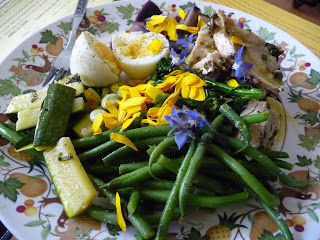 |
| Tomato seedlings on the window sill in the spring |
Canning pots rattle throughout the land and freezers bulge. Dry, cool spaces are hung with garlic, beans, onions, squash, ears of popcorn and other foods that (mercifully) require no electric power or more of our time to preserve. Power bills are high in the fall from food dryers, canners and new freezers. Yes, it's a lot of work and I confess my enthusiasm for it isn't quite as strong as it was a couple of decades ago, but once I get started and see colorful, glistening armies of jars lined up on the kitchen counter, that old self-sufficiency glow is rejuvenated.
This is the true time of thanksgiving, when we have more than we can possibly use and think of those without enough food. I'm grateful not only for the bounty but for the space and ability to grow and preserve it. It seems every day the news proves we have less and less control over our lives. Growing food is one thing we can control to some extent. Mother Nature has a strong say in our success and even she has ratcheted up the challenge knob more than once, but that's part of the game and so far we've at least filled the larder and usually start each
season of preserving with some still left in the cupboard. That's our backup if or when an earthquake or fire or some other disaster visits our neighborhood - if it doesn't get destroyed in the event. It brings my late friend, Bunny, to mind. She said she was so proud the first year she had a big garden and canned dozens and dozens of jars of produce. Her husband built special shelves in their basement to store all the bounty. One night, they heard a terrible crash and went downstairs to find the weight of all those jars proved too much for the shelves and all that work lay amid countless shards of glass. She never canned again.
Don has taken over much of the gardening, especially the year-round part. I'm a fair-weather gardener and the years I did it all by myself (plus most of the preserving) were exhausting and I was always grateful when fall arrived and the
 |
| Tomatillos ready to roast |
We've eaten mainly local foods for the last 20 years since most of it came from our garden. Now, we can supplement with so many other local products that you barely have to put extra thought in creating mostly all-local meals. I know that's another thing to be grateful for - and
I am. My work has allowed me to meet most of the local farmers and interview them for stories or columns. The same with countless small food businesses over the last 35 years. What good fortune! Some of those food businesses are no longer around, others have been sold to other people or to larger businesses. Some celebrate milestones and get even better each year. Knowing all of these folks has given me insight into what it takes to build and keep a farm or business going. It makes what I thought was an enormous garden seem pretty puny (about 1/3 of an acre - I jokingly called myself a "fardner" when doing it myself - too small to be a farm but too big to be just a garden). If any of my crops failed I could go to one of them to buy whatever didn't work for me. Who could they turn to?
 |
| The only things not local in this Nicoise salad Don made (with local albacore) is the salt, pepper and olive oil. |







